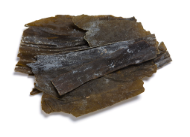Can Dogs Eat Seaweed?
‘Seaweed’ is an umbrella term for the many species of marine algae and plants. All varieties of seaweed are technically edible, but many are either too difficult to process for cooking or flavor, can upset the stomach, or carry dangerous toxins. A few types of seaweed are edible and choice, eaten commonly around the world, and used both for culinary and medicinal purposes.
We know people can eat seaweed, and that many marine species eat seaweed, but can dogs eat seaweed?

Basic answer: Yes!
Now let’s take a closer look at how you can keep your pup safe while letting them enjoy this oceanic veggie.
Is Seaweed Safe for Dogs?
In most cases yes, seaweed is safe for dogs, but as with all foods, there are possible risks, and some rules to follow to avoid those risks. Here are a few important pieces of advice for safely letting your dog eat seaweed:

Common Types of Seaweed
Seaweed is most commonly used as an ingredient in East Asian cooking but can be found around the world today in grocery stores and on restaurant menus. Some of the common types of seaweed you’ll come across include:
|
Seaweed Type |
What Does It Look Like? |
Common Uses |
Format |
Safe for Dogs? |
|
Nori |
 |
Sushi rolls, “seaweed snacks” |
Used in dry sheets |
Yes! In moderation |
|
Wakame |
 |
Seaweed salad, miso soup |
Rehydrated from dry |
Yes! In moderation |
|
Kombu |
 |
Broth flavoring, salads |
Rehydrated from dry |
Yes! In moderation |
|
Dulse |
 |
Broth flavoring, seasoning, marinated side dishes |
Rehydrated from dry |
Yes! In moderation |
|
Spirulina* |
 |
Nutritional supplement |
Powder |
Yes! In moderation |
*Technically an algae.
While these are the most common seaweeds you’ll find in your local store, other varieties of kelp (a variety of seaweed that includes more than 100 species) are also recommended for dogs, and used in seaweed supplements.
Nutritional Value of Seaweed
Seaweed is super nutritious, both for humans and dogs! Packed with antioxidants, prebiotics, and key nutrients like magnesium and iron, seaweed has been used for centuries for its nutritional and culinary value. Some studies even suggest that certain varieties of seaweed have anti-tumor properties, and could be used to treat cancer.
How Much Seaweed Can I Give My Dog?
Dogs should get the majority of their calories and nutrition from their regular diet, so like all treats, seaweed should only be a once-in-a-while treat. A small piece of nori or a few strands of wakame are totally safe for your pooch, but remember that salted and seasoned human treats aren’t always healthy for your dog.
If you want to regularly give your dog seaweed so they can enjoy the nutritional benefits, check out some of the options we’ve listed at the end of this blog.
Can Dogs Eat Seaweed? The FAQ

Now it’s time to answer your questions! Here’s what our community of loving dog owners wants to know about dogs eating seaweed.
Can Dogs Eat Packaged Seaweed?
Yes, but in moderation. Packaged seaweed is the only seaweed you should ever allow your dog to eat, but the kind you give them matters. Seaweed snacks are processed with heavy oils and seasonings, so that would be something to only give your dog once in a while. Processed kelp supplements, on the other hand, can be added to your dog’s regular diet - just be sure to chat with a vet before you make changes to their food.
What Happens if a Dog Eats Seaweed?
Nothing! Unless your dog eats an enormous amount of seaweed, has an allergic reaction, or chokes on the seaweed, they should be completely fine after eating seaweed. If you are concerned at all about your dog’s health, contact your vet immediately.
Is Seaweed Good for Dogs?
Yes! Unsalted and unseasoned seaweed is good for dogs, but it should not be their main source of nutrition.
Can Dogs Eat Seaweed from Lakes & Oceans?
NEVER allow your dog to eat seaweed or algae from a body of water. Similarly, you should not allow your dogs to swim in areas known to have blue-green algae, a possibly deadly variety of algae. If you like to swim with your dog, make sure to check local resources to learn which places are safest for you and your pup.
Best Ways To Give Your Dog Seaweed
While your dog can enjoy a few little bits of the seaweed you eat, it’s better to give them seaweed that has been processed specifically for dogs. Seaweed treats, like these dental dare jerky treats that contain ground seaweed, are safely formulated for your dog’s biological needs and might taste better to your four-legged pal than pure seaweed. That said, many dogs really like the taste of seaweed!
Another great option is to add a food topper or natural seaweed supplement to your dog’s diet. Great for healthy digestion, skin, fur, and immune health, powder supplements are a super easy way to give your dog extra nutrition without much time or effort. As with all dietary changes, be sure to talk to your vet before adding a seaweed supplement to your dog’s food.








